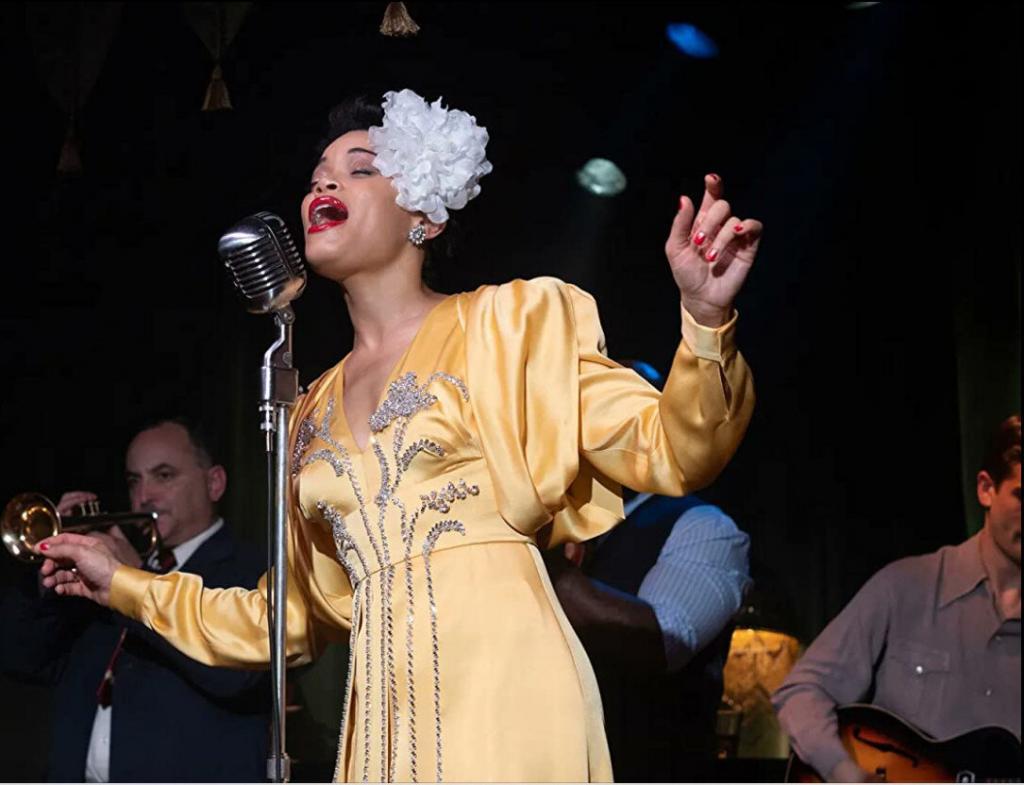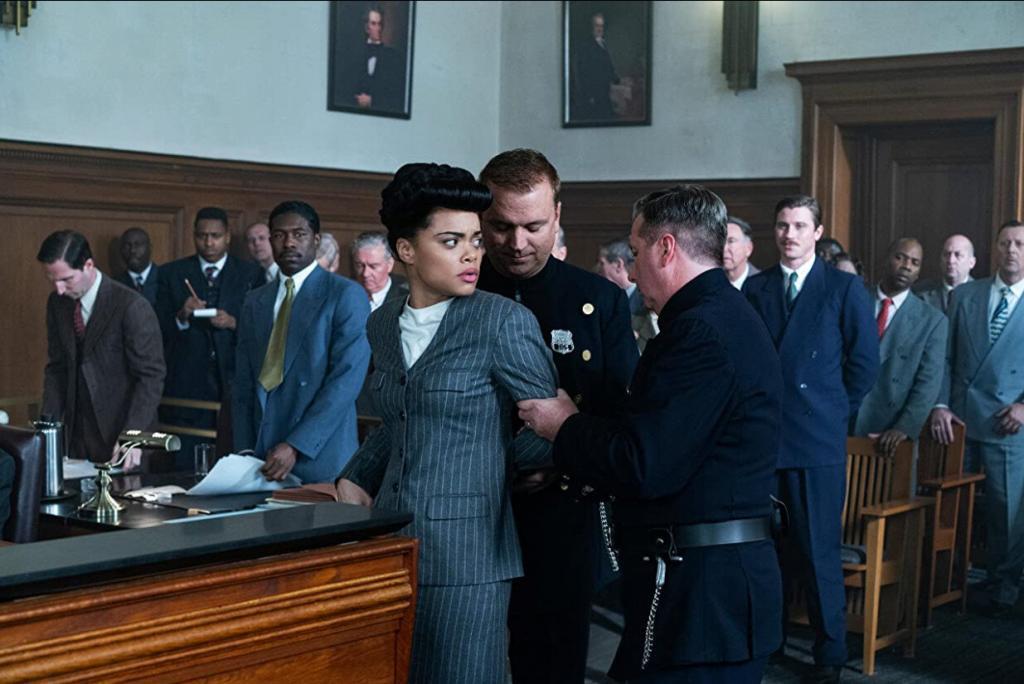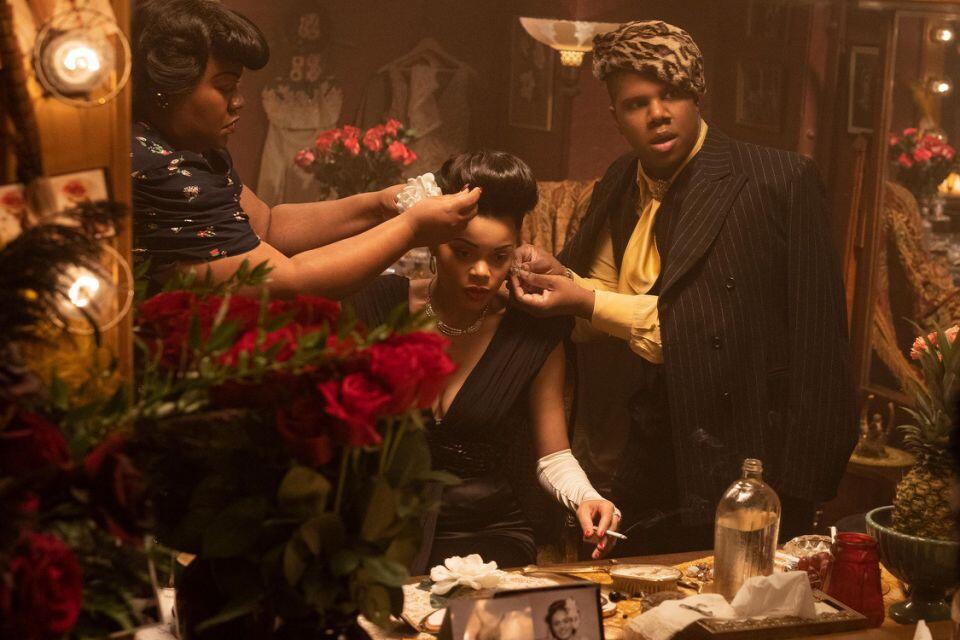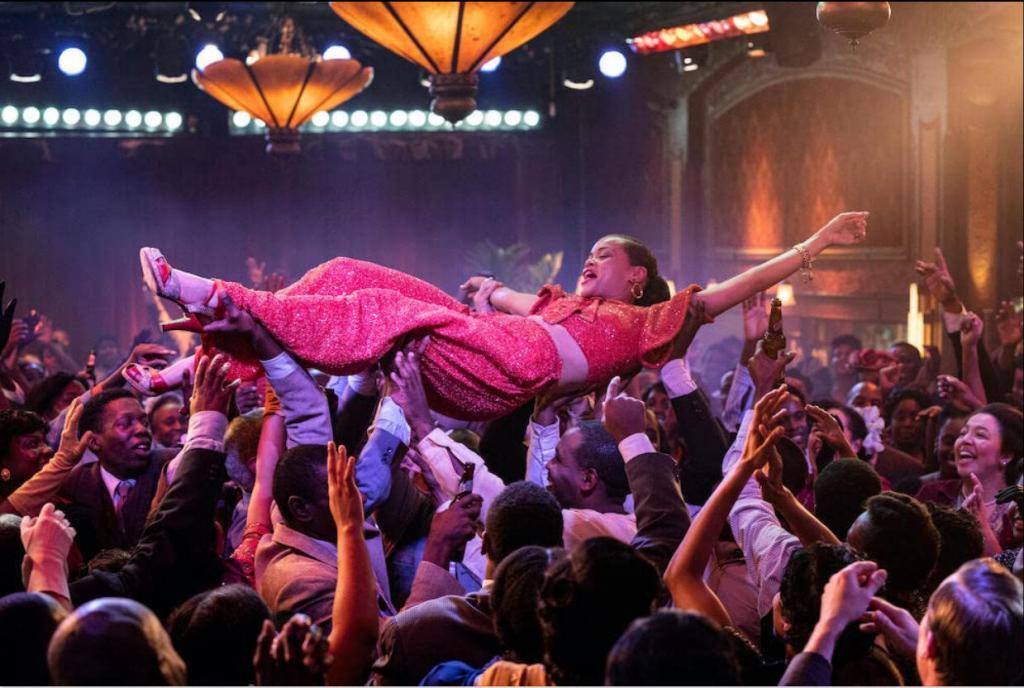
Copyright: © 2020 Paramount Pictures Corporation. All rights reserved.
Billie Holiday has inspired a number of books–often with conflicting views–that try to get a handle on her tumultuous and complex life. There’s an autobiography of dubious veracity–Lady Sings the Blues–that was the basis of a film with Diana Ross in the title role. Lee Daniels, director of The United States versus Billie Holiday, says he asked permission from Motown founder Berry Gordy, who produced Lady Sings the Blues, and got it. “I don’t think I would have done the movie if he said, don’t do it.”
The other source material for Daniels’ film is the book Chasing the Scream: The First and Last Days of the War on Drugs by Johann Hari. In choosing this book, the filmmakers are putting the conflict between U.S. drug agents and Holiday at the center of the film. Structurally, it’s a reasonable choice, but there are significant problems with the source material and Daniels’ handling of it that puts the film on a shaky historical foundation.
The film alternates between scenes of successful stage or club appearances and the self-destructive part of her life-heroin use and abusive relationships. Flashbacks take us to her dreadful childhood and being “turned out” by her mother. Overall, the film gives us a sense of the central emotional battles that Billie Holiday grappled with.
Andra Day is cast in the lead, and she does a good job of catching the inflections, and a great deal of the timbre of Holiday’s singing and speaking voices. Day was a singer who’d done little acting, but she is convincing in this film. Physically, she has only a passing resemblance to Holiday, who had a broader face and more physical heft. She actually looks more like Eartha Kitt. Andra Day says she had to lose weight for this role, which makes no sense in terms of her resemblance to Holiday, but does if one infers its importance to the filmmakers, who have Day playing several nude scenes in the film.
The writing and direction does a good job creating a well-balanced ensemble whose day-to-day conversations have a convincing, natural quality. However, the short orations that one or another cast member sometimes step out to make are too much “telling” at the expense of showing.
The film shows us several interviews between Holiday and a fey, bewigged interviewer identified as Reginald Lord Divine. I don’t know if he’s supposed to represent a specific media personage of the 1950’s, but his ridiculous questions certainly represent white obliviousness to the realities of Holiday’s life. Throughout the film, we will witness the troubled relationship Holiday has with white managers, promoters and the governmental power structure, which makes these interviews, with little at stake, seem pretty superfluous.
Her major antagonist in the film is Harry Anslinger, head of the Federal Bureau of Narcotics, who used racist stereotypes to hype up fear about drugs and made it his crusade to bust as many jazz musicians as possible. Anslinger hires black F.B.I. agent Jimmy Fletcher to bust Holiday for drug possession and the uneasy position of Fletcher is an important sub-plot. On the one hand, Fletcher feels like a traitor to his race and on the other, he believes that narcotics are wrecking havoc in Harlem.
Holiday was actually busted by Fletcher and did have some kind of relationship with him, but the filmmakers push it past the point of credulity, with a series of idyllic romantic scenes. The idea, apparently, was to make her choice to jilt Fletcher and return to abusive relationships seem even more stark and ill-fated.

Copyright: © 2020 Paramount Pictures Corporation. All rights reserved.
The proposition forwarded in the film, and reflected in the title The United States vs. Billie Holiday is that Holiday stood up to the government by singing the powerful anti-lynching song “Strange Fruit” and that her persecution by the government resulted, in large part, from her not obeying Anslinger’s demand to stop singing it. Johann Hari, author of Chasing the Scream says his information about Anslinger telling Holiday not to sing “Strange Fruit” comes from letters that he got access to from William Dufty, who wrote Lady Sings the Blues. This hardly pins it down. I researched it and consulted with knowledgeable people and can find no direct evidence that Anslinger actually told her to stop singing “Strange Fruit.” Since this is so central to the film, I’ll go into it more deeply.
Holiday’s history with “Strange Fruit” is complicated. I highly esteem the song and her performance of it and actually produced a radio play about it. Initially, she balked at singing the song, written under the pen name Lewis Allen by school teacher-communist-labor activist Abel Meeropole, but Barney Josephson, owner of the Café Society, convinced her to perform it. He told her it would be the last song of the night, the lights would go down and quiet would be enforced in the club.
The film says that Holiday “kicked off” the civil rights movement when she sang “Strange Fruit,” which they imply on the film is in the 1940’s. In fact, she first sang it in 1939, by which point the civil rights movement was actually already well underway. The NAACP was founded in 1909. By 1930, thousands of black Harlem residents were organized into politically-oriented labor organizations and in 1934, the Southern Tenant Farmers Union was created. These were part of a larger progressive political and union front that supported the civil rights movement, making this the likeliest era that a song like “Strange Fruit” would find acceptance beyond a black audience.
In the late 1940’s, the country began to shift strongly to the right, and the Red Witch Hunts to “root out” communism began that culminated with the rise and fall of Joseph McCarthy. Anslinger managed to tie together this admixture of anti-communism, patriotism, racism and drugs to get increased funding for his agency, but his real obsession was with drugs.
Holiday was not a political person. Trumpeter Frank Newton, with whom she worked at Café Society and recorded “Strange Fruit” in 1939 tried to approach her to talk about politics, and she profanely dismissed him. I’m sure such a song provoked some racist response, but it increased Holiday’s esteem with black audiences as well as the size of her general audience. I’ve tried to find instances of her being harassed for singing the song, but haven’t found any.
The film tries to convince viewers how direct the tie was between “Strange Fruit” and government intimidation by depicting Holiday being forcibly removed from the stage during her 1948 comeback concert at Carnegie Hall when she started to sing the song. Only problem is-she did sing it at that concert. And, would she have been allowed to make V-discs to be sent to soldiers around the world if her relations with the white power structure were so bad?

As far as capturing the personality of Holiday, I think the film does a good job–up to a point–and I’ll re-visit this later in the review. She was profane, unafraid to speak her mind and also presented as emotionally vulnerable. The film shows her relationship with Tallulah Bankhead, but as portrayed, the viewer wouldn’t necessarily know that Holiday was bisexual. In fact, in a scene where she and Bankhead enter a hotel and a black elevator operator refuses to let Holiday ride on the guest’s elevator, Holiday says: “I can’t ride on it, but a bunch of goddam bull dikers can.”
The locations and costumes have a realistic look and the film draws the viewer pretty consistently into the moods it tries to create. That said, there are definitely a number of gaffes, some of which would especially bring jazz people up short.
Lester Young is pretty much her constant companion through much of the film. This greatly exaggerates how much time they spent together at this point in their lives. Jazz lovers will note that whenever we hear the tenor sax allegedly being played by Prez, it sounds nothing like him. Even more ludicrous–in one scene, we see Young skipping rope, for exercise.
Holiday might have dismissed as unhip many of the instrumental backgrounds used in the film for her concert appearances. They’re smoothed out and over-orchestrated. Although earlier in her career she performed with larger ensembles, even big bands, her basic format became the quartet or quintet and she did not perform live with string sections, as she does in the film.
Holiday did do one studio recording with strings in the 1940’s that produced the tune “No More.” Then in 1958, near the end of her life, she did a session with the Ray Ellis orchestra for the Lady in Satin LP. Adjusting the musical background of her vocals to be more palatable for modern audiences meant that the filmmakers didn’t frame Andra Day’s musical performances in a way that allows us to hear the truth that she is able to find in re-creating a Billie Holiday performance.
Louis Armstrong was the foundational musician and MC for the V-discs they did together, and he introduced Holiday as his guest, not vice versa, as in the film. And, the idea of Armstrong playing with a mute in his trumpet is an odd one.
In a scene set in a club in New Orleans in the late 1940’s, we hear Ray Charles’ song “Hallelujah I Just Love Her So.” Quite a trick, as it wasn’t released for another 10 years.

Copyright: © 2020 Paramount Pictures Corporation. All rights reserved.
“Walkin’ the bar” was a well-known phenomenon in R&B bars, but in a scene in Baltimore in 1949, while singing “Gimme a Pig’s Foot,” Holiday leaves the stage and crowd surfs. Highly unlikely.
The film tries to make the point that in her drug use “She only hurt herself.” We can see the war that Anslinger waged as a foul waste of resources and the cause of much suffering, but unfortunately, Holiday’s choices and unreliability did hurt fellow musicians, as trumpeter Red Allen has attested to. Someone in the film also says “That young lady is a hero,” but it’s a hard road to make Billie Holiday a “hero” in the way the film wants to. She was a great artist and persevered through racial abuse and harassment, but like most of us, Billie Holiday was made up of many contrasting parts, and heroes in film are seldom represented in their full humanity.
Holiday wanted and/or needed to go to some very dark places—and she did. This was the agency she took in her own life. In the scene where Fletcher busts her, Holiday strips off her own clothes and says he should search her, not a female agent. This actually happened, with one more step in real life not shown in the film–that after taking off her clothes, she urinates in front of them. However you’d care to interpret that gesture—defiant, insulting, confrontational, self-abasing, whatever—it was beyond the calculus of the filmmakers’ conception of how to represent Holiday.
The daunting complications and contradictions she embodied constitute the mystery that was Billie Holiday–a mystery that fed the magic in her music. It feels reductionist, and even deceptive to make her the standard bearer for anything, even for a cause like civil rights.
I’ve previously grappled with the issue of balancing historical accuracy with the need to tell stories of black agency. See my review of Ma Rainey’s Black Bottom. The general audience will find in The United States versus Billie Holiday a well-made film, with a strong lead actor. Since the film allegedly portrays real characters and has some very specific historical and political points it wants to make, it’s worth taking it on its own terms. That’s why I hold it to account.
For more on Billie Holiday, and to listen to key musical milestones in her career, read: Billie Holiday: Profiles in Jazz
Steve Provizer is a brass player, arranger and writer. He has written about jazz for a number of print and online publications and has blogged for a number of years at: brilliantcornersabostonjazzblog.blogspot.com. He is also a proud member of the Screen Actors Guild.






















